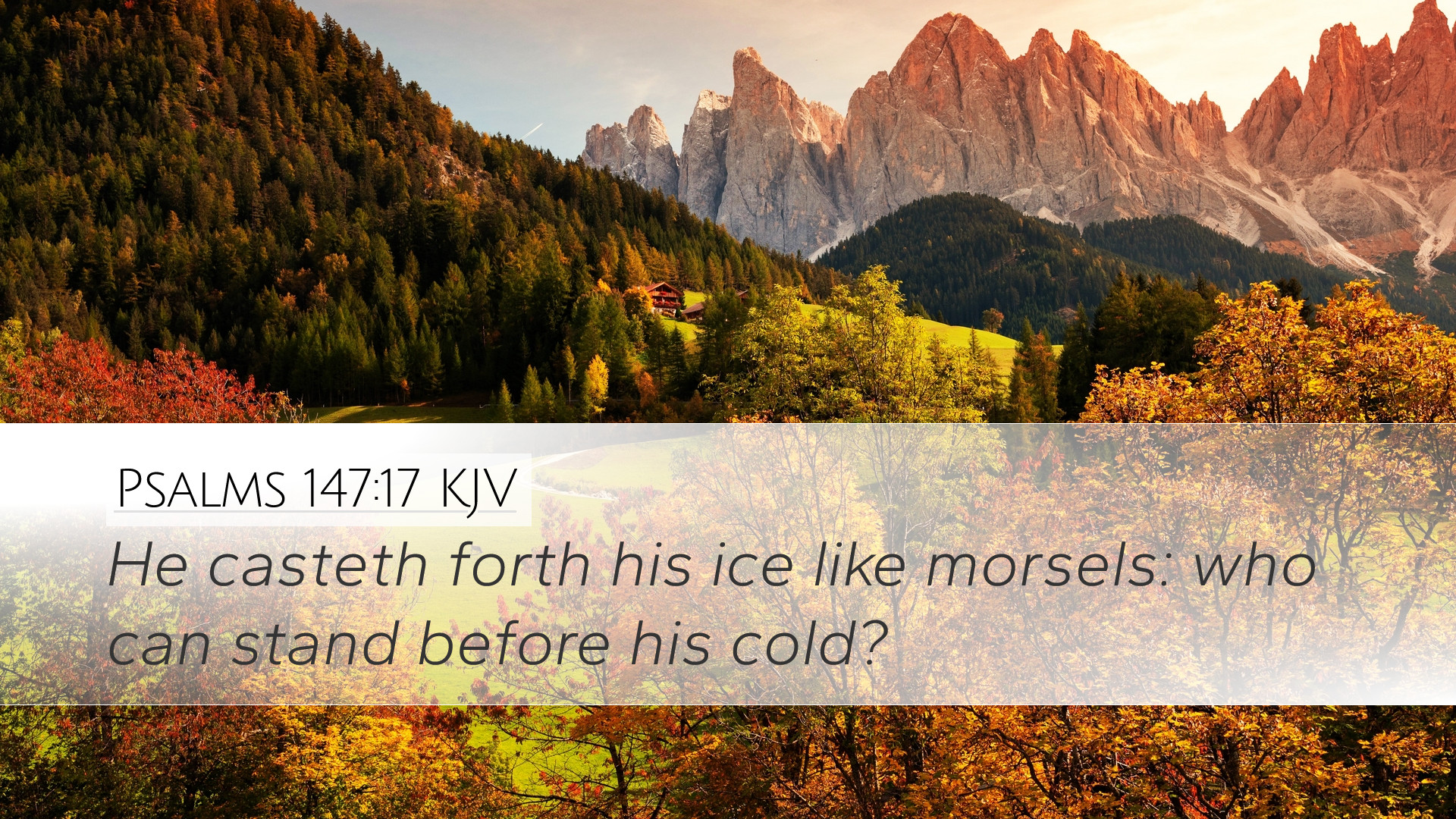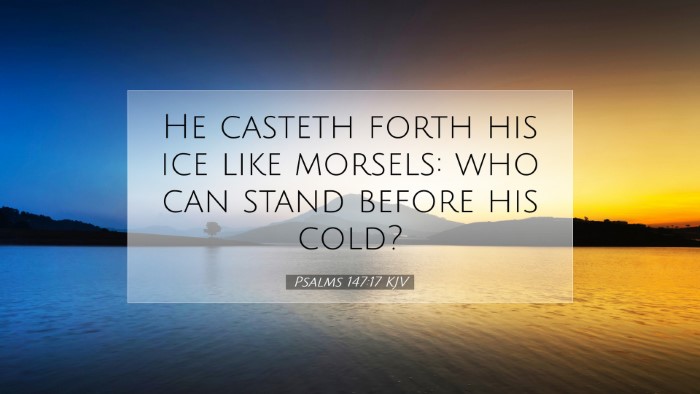Psalms 147:17 - Commentary Overview
Verse: "He casteth forth His ice like morsels: who can stand before His cold?" (Psalm 147:17, KJV)
Introduction
The verse, an illustration of God's power over nature, speaks to His sovereignty and the awe-inspiring aspects of His creation. It reveals how God exerts authority even over the elements, casting forth ice as He wills. The imagery evokes both the beauty and the fear associated with nature's extremes, compelling scholars and theologians alike to delve into its meaning.
Commentary by Matthew Henry
Matthew Henry emphasizes the dual nature of God's creative power and His authority. He notes:
- The Sovereignty of God: Henry reflects on how God controls even the most violent aspects of nature. The phrase "casteth forth His ice" suggests a deliberate act of power, displaying that nothing in creation happens without His command.
- The Symbolism of Ice: Ice is seen as a symbol of God's judgment as much as His creativity. Like morsels, the cold can be distributed as blessings or as judgments, showcasing God's various roles in the lives of humanity.
- Human Response: The rhetorical question "who can stand before His cold?" prompts introspection. It indicates human frailty in contrast to divine power, making it clear that God's might is unchallengeable.
Commentary by Albert Barnes
Albert Barnes offers a significant perspective on the contextual meaning of the verse, noting:
- The Context of Praise: Barnes contextualizes this verse within the Psalm's broader theme of praise for God’s creation, where the natural world stands as evidence of His wisdom and strength.
- Metaphorical Significance: He argues that the references to ice illustrate the transient nature of God's blessings and judgments, underscoring the ephemeral quality of human concerns against God's eternal plans.
- Invoking Fear of the Lord: The concluding question serves as a reminder of the reverence required in our relationship with God, as His raw power demands our respect and fear.
Commentary by Adam Clarke
Adam Clarke provides an exegetical approach to the wording and implications of the verse:
- Literal Interpretation: Clarke breaks down the language used, commenting on the exact nature of "morsels" and "cold." He provides a detailed examination of how ice forms and its resulting effects on the environment.
- Theological Implications: He delves into theological nuances of God’s interaction with the physical world, suggesting that God's creation, including ice, aligns with His purposes and reflects His nature.
- Caution and Knowledge: Engineering a connection between understanding nature and recognizing God's majesty, Clarke posits that human academic pursuits should lead to greater humility before the Creator of the universe.
Theological Reflections
This verse opens the door to numerous theological reflections that can guide pastors and theologians:
- God’s Authority: The unchallengeable authority of God as supremely sovereign over creation invites believers to recognize their humble position in relation to divine majesty.
- Nature as Revelation: Creation itself provides testimony to God’s character, challenging the faithful to be attentive to the messages God communicates through the world around them.
- Judgment and Mercy: The interplay of God’s judgment (often represented by cold and ice) should be examined in light of His mercy, reminding believers to seek His grace while understanding the serious nature of divine justice.
Practical Applications
This passage lends itself to various practical applications for the modern believer:
- Encouragement in Trials: When facing life's 'cold' circumstances, believers can find comfort in knowing that God orchestrates these situations according to His divine wisdom.
- Inspirational Worship: Reflecting upon God's power in creation can inspire deeper worship and revere, drawing the faithful closer to an understanding of His greatness.
- Interpersonal Relationships: Just as God has authority over the natural world, so too should believers exercise love and respect in their relationships, acknowledging the diverse roles individuals play in God's creation.
Conclusion
Psalms 147:17 encapsulates a profound truth about the nature of God as Creator and Sovereign. Through the insights provided by various commentaries, we see how this verse speaks not only to the power of ice but also to the broader themes of divine control, human vulnerability, and our call to reverence. Each reflection invites deeper study and application of this rich text, urging believers to stand in awe before the One who commands the elements.


